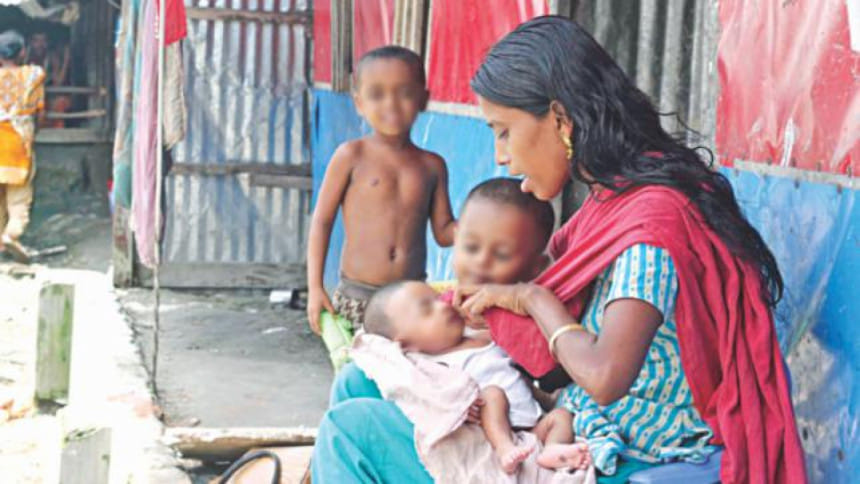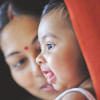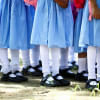Maternal Healthcare: Slum women left to fend for themselves

Eighteen-year-old Julekha Begum, of Tejgaon slum, was married off at 15 and is currently in the ninth month of pregnancy.
Even with a history of stillbirths, throughout this pregnancy, she visited a local private hospital only once at the cost of Tk 1,500.
A 2016 WHO guideline recommends a minimum of eight visits to reduce perinatal mortality -- the number of stillbirths and deaths in the first week of life -- and improve the expectant mothers' care.
Despite suffering from sharp abdominal pains, Julekha is reluctant to make further visits due to the cost, and is instead opting for a home birth with an untrained midwife.
Even with considerable development in the country's maternal healthcare, there is visible ignorance when it comes to mothers in city slums.
Compared to mothers in non-slum areas, those in slums don't receive the required antenatal or postpartum healthcare, nor have access to essential prenatal micronutrients or a trained birth attendant.
Sabina Begum*, 20, gave birth to her firstborn recently, after having suffered from severe water breaking, long before her expected delivery date -- without any antenatal care (ANC), the care mothers get from health professionals during their pregnancy.
A 2021 Bangladesh Urban Health Survey (BUHS), conducted by the National Institute of Population Research and Training, shows that only 40 percent of pregnant women in slums received over four antenatal care checkups.
Dr Ferdousi Begum, president of the Obstetrical and Gynecological Society of Bangladesh, said ANCs ensure the routine care of mothers and unborn children to detect possible problems, prevent maternal deaths and birth immaturities, and prepare mothers for childbirth.
"Inadequate ANCs can cause major complications, nutrition imbalance, and delivery or family planning difficulties. Missing vaccines can lead to other health issues."
Pregnant mothers are also recommended to take iron and folic acid, calcium carbonate, and vitamin B supplements with a diet rich in nutrition-dense foods.
However, six-month-pregnant Rina, from Kalyanpur slum, said, "Sometimes, we have to skip meals. How will we afford milk, fruits or supplements?"
The government's Maternal and Child Health Training Centre provides free ANCs and prenatal vitamins for the underprivileged, but most of the women in slums are unaware of this.
An overwhelming majority of the expectant mothers in slums, who were interviewed by The Daily Star, showed preference for home births, unless they experienced earlier pregnancy complications or suffered from any life-threatening conditions.
The BUHS survey also said almost half of all slum mothers prefer to deliver at home, even though facility deliveries has increased by 17 percent in 2021 from 2013.
Only two interviewees said they wish to deliver at hospitals as both of them had faced major complications during previous home births with untrained midwives.
About financial aid from the government or NGOs, they said people come to note down their names and promise money that never comes.
"Earlier, I saw NGO officials come to our slums, but during my pregnancy, there was none," said Sabina.
Health and nutrition experts say slum mothers must get priority in the government's nutrition programmes, especially after the pandemic largely affected their dietary patterns.
The BUHS survey also found that in children of urban slums, the rates of under-5 stunting is 34 percent, wasting is 16 percent and being underweight 28 percent. All three rates are the highest compared to other urban areas.
Slum mothers were even excluded from the women and children affairs ministry's programme titled "Maternity Allowance", initiated in 2010-11, for the poor and underprivileged pregnant women to meet their increased nutritional demands.
Additionally, another ministry's project -- "Karmajibi Lactating Mother Sohayota Tohbil" -- provided training and a Tk 800 monthly allowance to 2,77,000 underprivileged lactating mothers for three years. However, only 133 women of the Kalyanpur slum received the money.
Both programmes were later merged and renamed as "Ma O Shishu Sohayota Kormosuchi".
In 2022-23 fiscal, 7,740 poor expecting and lactating mothers of Dhaka South and North are supposed to receive Tk 800 per month through this programme.
But this number represents only 0.62 percent of the mothers in the capital's urban areas compared to the total targeted beneficiaries (12,54,000).
"The total allocation for this year is Tk 12,43,000 crore, 98 percent of which will be disbursed as allowances," said Rubina Ghani, director of the new programme.
However, finalising the beneficiaries took time as the women's affairs division faced some delay inpayingthe Election Commission to verify their NIDs, as per a finance ministry directive.
The money has been paid now, she said.
"Slum mothers can now apply for the allowance but the NID verification and receiving the money will be a month-long process."


 For all latest news, follow The Daily Star's Google News channel.
For all latest news, follow The Daily Star's Google News channel. 








Comments